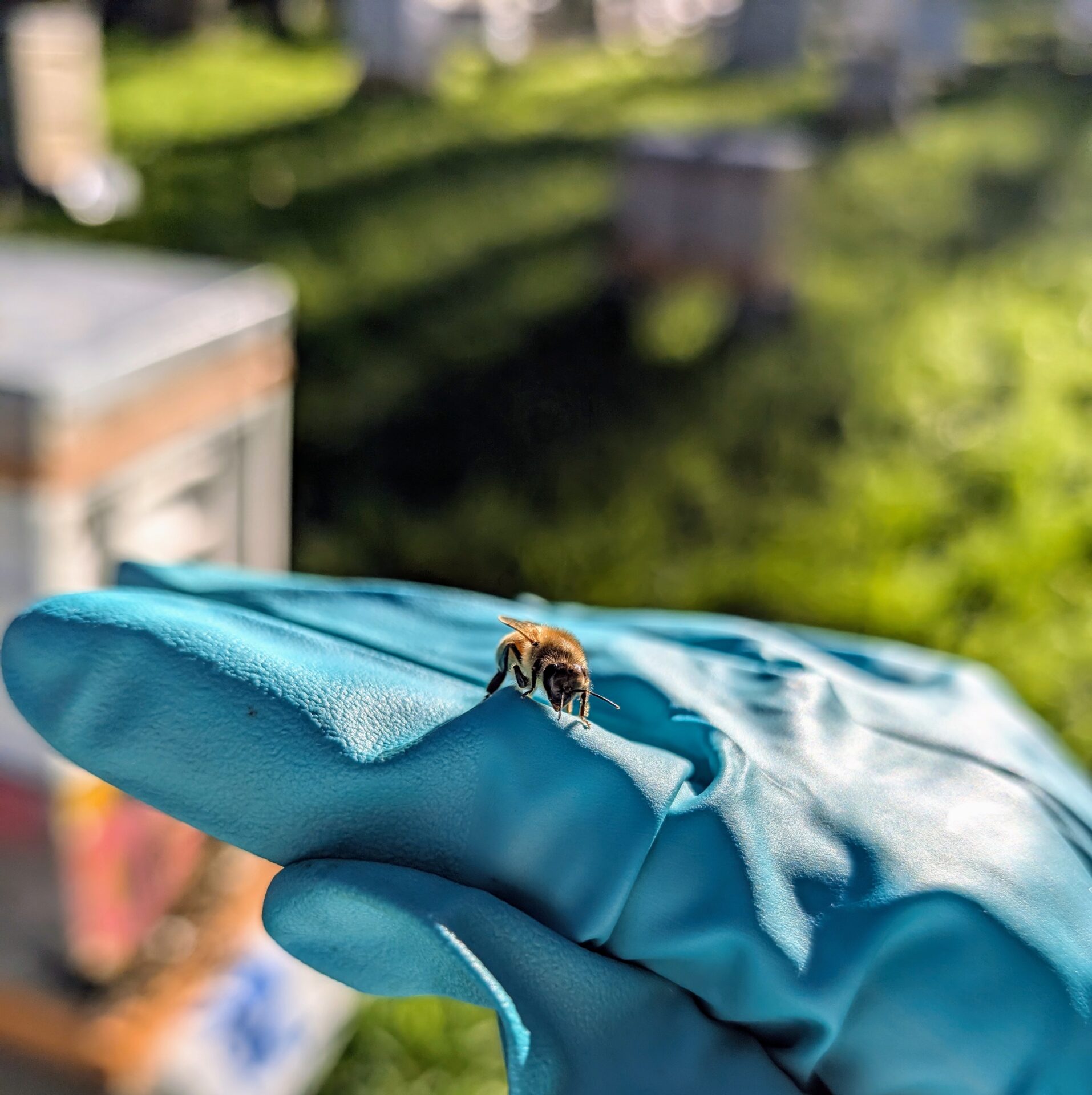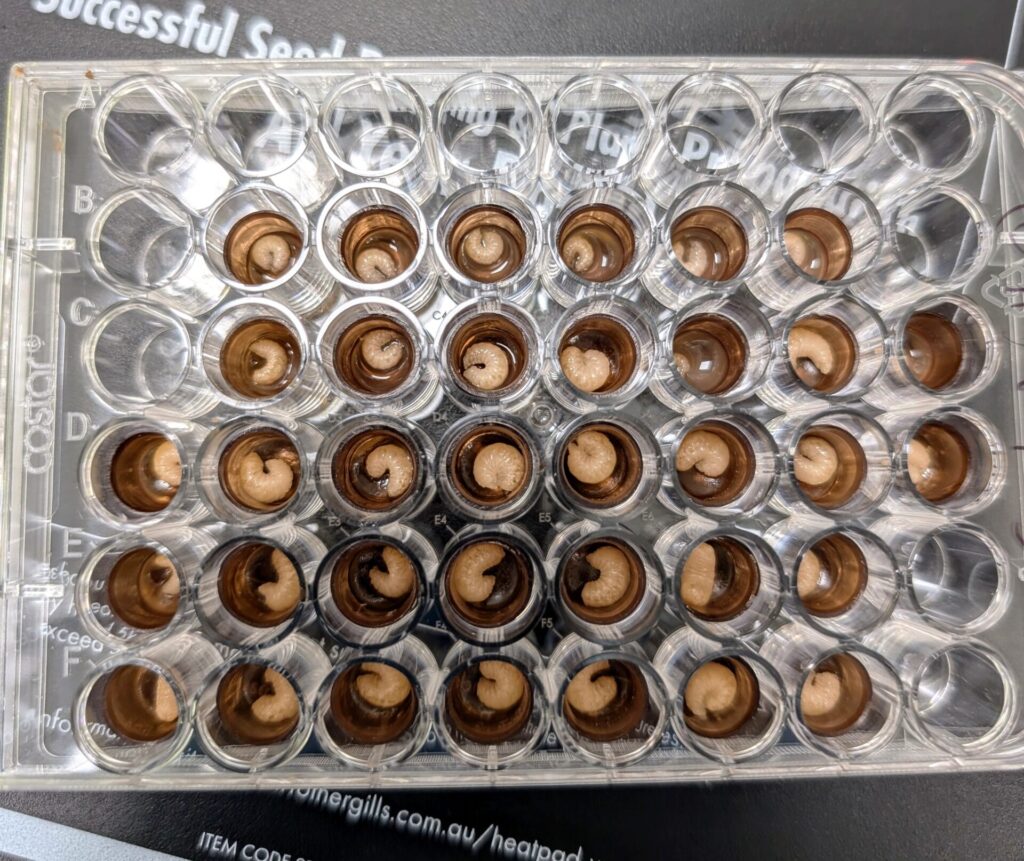Can Probiotics Help Defend Honeybees from Common Diseases? Project Update August 2024
29 August 2024Article written by Dr Georgina Binns, Research Officer, Eco-Immunology Lab, Macquarie University Researchers are assessing the effects of probiotic treatments on honeybees to increase brood survival against common brood diseases. […]

Article written by Dr Georgina Binns, Research Officer, Eco-Immunology Lab, Macquarie University
Researchers are assessing the effects of probiotic treatments on honeybees to increase brood survival against common brood diseases.
Honeybees have been victims of their success as pollinators with pathogens and parasites colonising hives. Exposure to climate change, pesticides and pollutants has weaken bees’ health. Now, more than ever before, crop-pollinating honeybees need extra support to survive common pathogens. Our team at Macquarie University have been working on designing economical and naturally chemical-free probiotics to help boost disease-resistance in honeybees, particularly targeting brood pathogens such as chalkbrood and American and European foulbrood. These prevalent diseases infect colonies and reduce brood survival throughout the year, reducing bee numbers and negatively effecting pollination services.
The Honeybee Probiotics team, which includes myself, Post-doctoral Fellow Dr Darsh Rathnayake, PhD candidate Casey Forster, and that is led by Associate Professor Fleur Ponton, have recently completed a set of preliminary trials, where we grafted hatched larvae from our campus hives and hand-raise them in a specialised ‘insectary’ laboratory to adulthood.

We have focused on two probiotic treatments. The first is a set of honeybee gut microbes that we isolated from bee guts. These ‘native’ species of bacteria include members from the core-gut microbes found in all bees throughout the year, such as several Lactobacillus species, Bifidobacterium asteroides, Snodgrassella alvi and Gillamella apicola. We predicted that reinforcing the natural gut bacteria would create a thriving beneficial community within the brood gut, and therefore aid in safeguarding the gut from potential infections as well as supporting overall health.
The second treatment contains the same bacteria as the first, but with the addition of several ‘non-native’ species of bacteria that are commonly found in commercial probiotics for both humans and animals, such as Lactobacillus plantarum and L. rhamnosus. These species are found to grow quickly and prolifically. They may exclude and prevent other potentially harming species of bacteria and fungi (such as those that cause chalkbrood and foulbrood disease) from taking hold of the individual bee. As the larvae will shed all of their gut microbes prior to pupation, we felt that including these non-native species could give a short-term benefit to the individual, without negatively affecting the adult bee it will eventually become. Further, it gives an opportunity to test the efficiency of probiotic bacteria that are already on the market.
Our preliminary trials are showing that the non-native probiotic mix decreases brood to adulthood survival. The native mix, however, promoted brood survival and adult emergence. The next step of our experiments is to inoculate bee larvae with pathogens and test the effect of the mixes on their resistance. We predict that non-native probiotic bacteria will exclude pathogens from the gut, however we do not know how it will affect bee survival.
How many times should the treatment be given to be efficient is another important question. We investigated the frequency of probiotic treatments on bee survival. Previous studies have fed probiotics to larvae for five days consecutively during rearing. However, we believe that a treatment that can easily be used by professional beekeepers should be delivered in one or two doses. We ran two trials, where one set of brood were fed the probiotics only once, and the other set were treated five times. Interestingly, this preliminary trial found that dosing the brood with probiotic treatments five times significantly increased mortality. This suggests that repeated doses of beneficial bacteria can become detrimental to the individual over time.
Our next step is to test the efficacy of the probiotic treatments against the three bacterial and fungal pathogens we have stored in our laboratory, which we hope to start when the weather warms up. Keep up to date with our research by visiting our website: https://sites.google.com/view/aussiepollinatorhealth/home
Funding Acknowledgement;
Probiotics in honey bees to fight bacterial and fungal diseases (PH21003) is funded through Frontiers developed by Hort Innovation, with co-investments from Macquarie University and contributions from the Australian Government.
Cover image: Macquarie University has a number of hives on campus for research purposes. Image by Georgina Binns.
